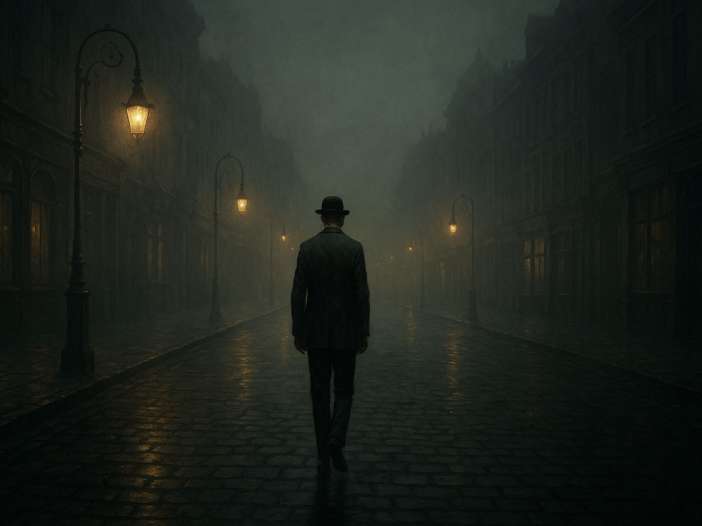
|
Getting your Trinity Audio player ready...
|
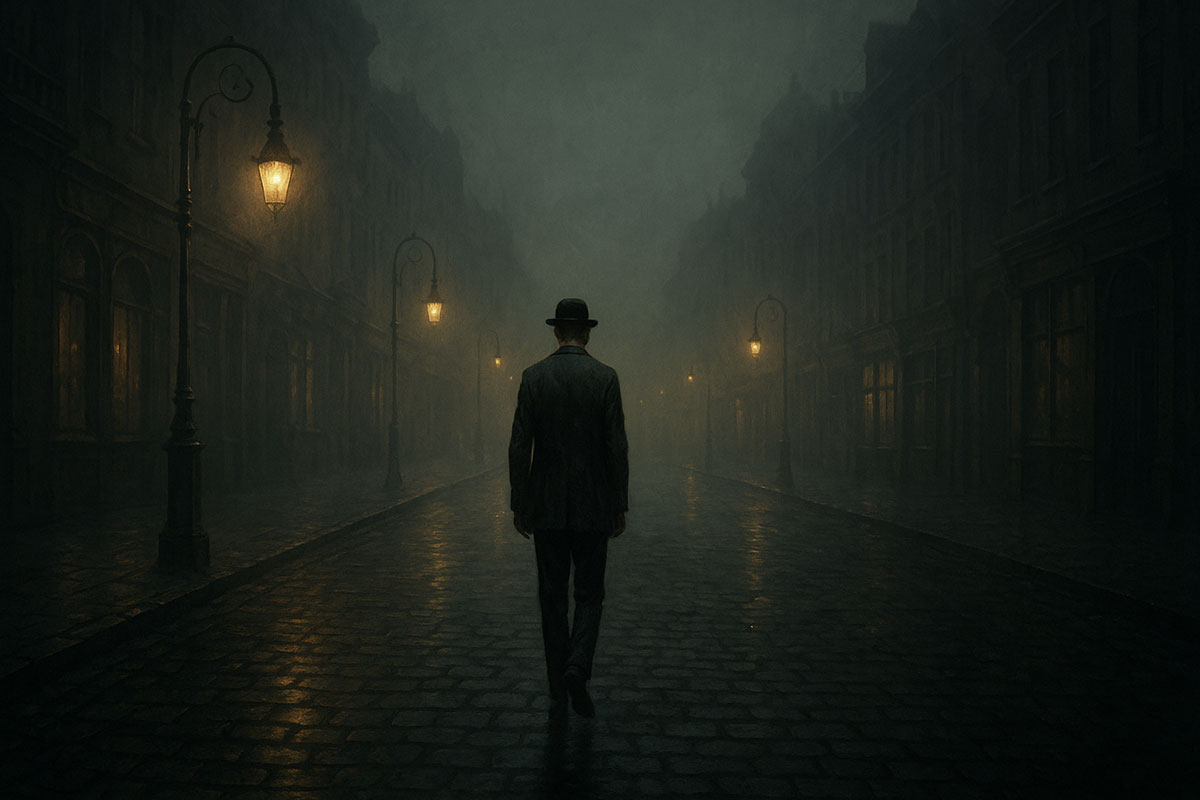
Prologue
[Stage is bare. A dim light rises to reveal ELIOT seated at a small desk, a manuscript before him. He looks up, addressing the audience with deliberate restraint.]
Eliot:
This is not a love song in any familiar sense.
It is not the hymn of fulfillment, nor the sonnet of devotion.
It is the monologue of hesitation,
The theater of thought where action never quite arrives.
You will meet a man—Prufrock—
A man of fragments, of whispers, of echoes.
He moves through rooms filled with chatter,
Yet his voice falters at the threshold.
He is haunted not by tragedy,
But by the tyranny of small decisions.
I offer him to you not as hero but as mirror.
What you witness tonight is not a story of great events,
But the tremor of consciousness itself—
The sound of a soul
Stalled in the corridor of possibility.
Attend, then, with patience.
The play begins not with a trumpet blast,
But with a sigh.

Scene 1 — The Invitation
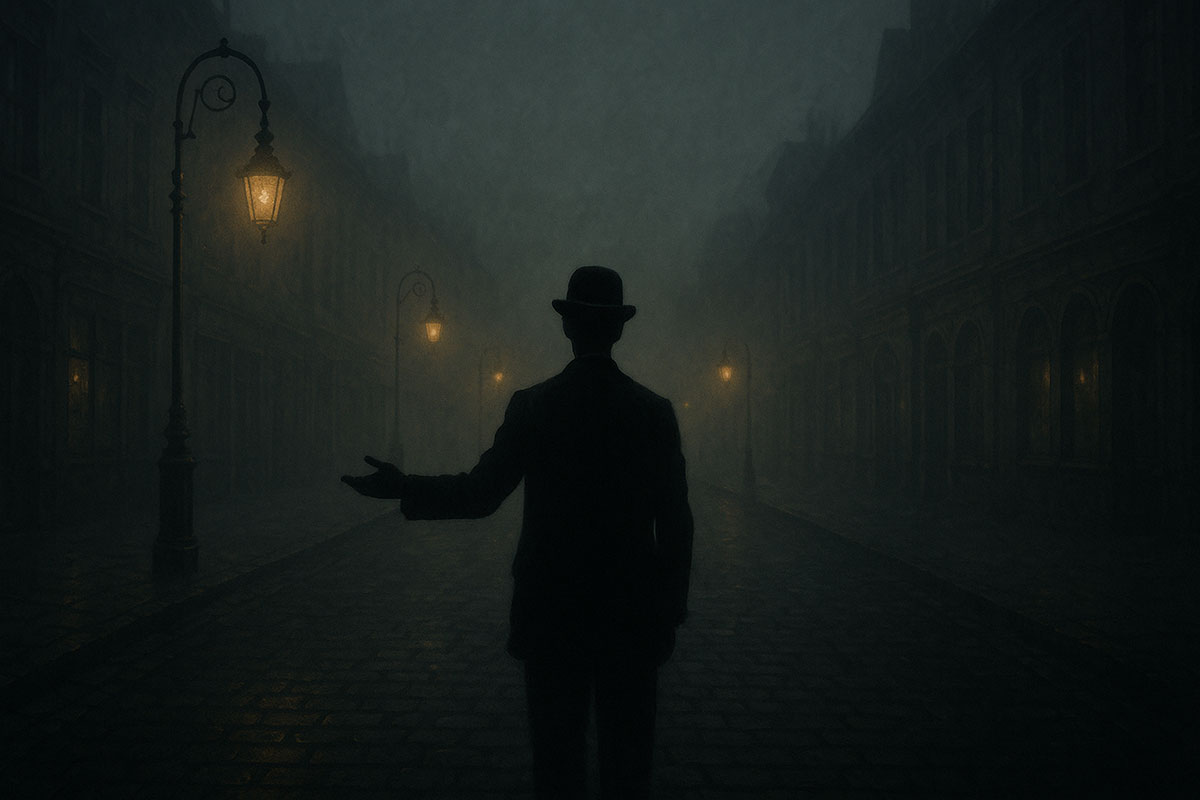
[Stage: Dimly lit street. The backdrop is a row of shadowy buildings. Gas lamps glow in a sepia haze, the faint sound of carriage wheels in the distance. A solitary figure, PRUFROCK, dressed in an ill-fitted suit, steps forward. He addresses the audience directly as though leading them into his thoughts.]
Prufrock:
Let us go, then, you and I,
When the evening is spread out against the sky
Like a patient etherised upon a table.
Do you feel it? The city exhales its fog,
And we are its passengers,
wandering through half-deserted streets,
The muttering retreats of restless nights.
[He gestures down the street. Prostitutes lean in doorways, men stumble drunk into alleys. He avoids them nervously.]
Do not be alarmed.
This is not the poetry of love but of hesitation.
Not the song of triumph but of… paralysis.
But still, come. Walk beside me.
There will be time—there will be time—
For decisions, for revisions,
For a hundred hesitant footsteps
That never quite arrive.
[He offers his arm to the audience, then withdraws it awkwardly.]
Let us go, then, before the night grows older.
[Blackout.]
Scene 2 — The Social Drawing Room
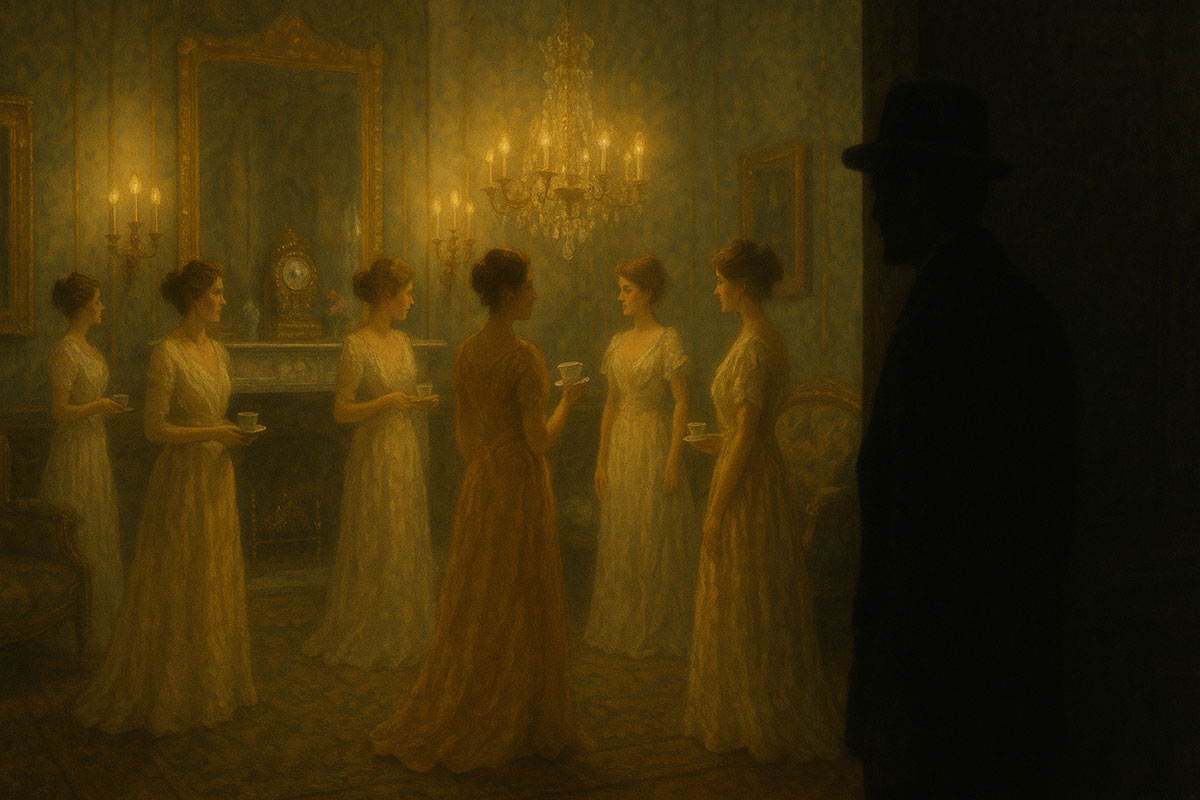
[Stage: A grand parlor. Women in gowns circulate with tea cups and chatter. A gramophone plays faint classical music. PRUFROCK stands at the edge, as though tethered by invisible strings. A CHORUS OF WOMEN speaks in overlapping fragments.]
Chorus of Women (overlapping):
“In the room the women come and go…
Talking of Michelangelo…”
Prufrock (aside to the audience):
Do you hear them?
Every syllable polished like silver cutlery,
Every gesture rehearsed,
Every laugh cut from marble.
And I—
I am the stain upon the wallpaper,
The cough in the corner,
The awkward guest no one remembers inviting.
[He steps forward, then falters. The women glide past him as though he were invisible.]
Prufrock:
Should I speak? Should I cross the carpet?
Should I say:
“I have known the evenings, mornings, afternoons,
I have measured out my life with coffee spoons”?
Would they nod politely,
Before returning to their Michelangelo?
[The Chorus repeats softly, hypnotically.]
Chorus of Women:
“In the room the women come and go…
Talking of Michelangelo…”
Prufrock (to himself, nearly whispering):
And so I linger here,
Not in the circle of light
But in the shadow at its edge.
[Music fades. Lights dim until only Prufrock remains in a spotlight.]
Prufrock:
Is this what eternity feels like?
One long hesitation,
One endless doorway
I cannot cross.
[Blackout.]
Scene 3 — The Mirror of Self-Doubt
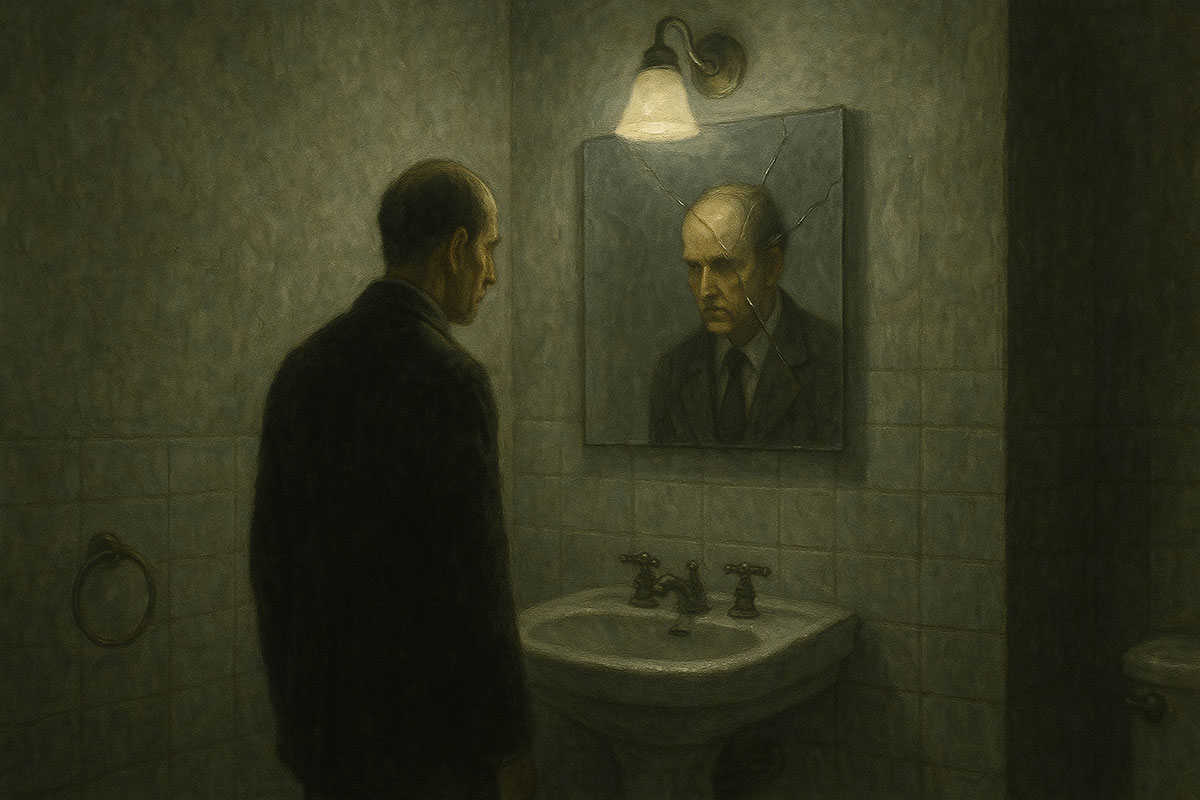
[Stage: A stark bathroom. A cracked mirror dominates the back wall. Harsh white light. PRUFROCK stares at his reflection. His voice echoes, fragments of his thoughts bouncing like ghosts in the room.]
Prufrock:
They will say: “How his hair is growing thin!”
They will say: “But his arms and legs are thin.”
And I—
I prepare my face to meet the faces that I meet,
A thousand rehearsals, a thousand masks,
Each one discarded in silence.
[He leans into the mirror, almost pressing his face against it.]
Do I dare?
Do I dare disturb the universe?
[A VOICE FROM THE MIRROR, deeper and more commanding, interrupts.]
Mirror Voice:
You are no prince Hamlet.
You are not even the Fool.
You are the background character
In the lives of others,
A footnote in someone else’s play.
Prufrock (desperate):
But is there not still time?
Time to turn back, to descend the stair,
To claim a life unsquandered?
Time yet for a hundred indecisions,
And for a hundred visions and revisions,
Before the taking of toast and tea?
Mirror Voice (mocking):
You dream of mermaids singing,
But their song is not for you.
[PRUFROCK collapses to his knees, clutching his face. Lights flicker violently, then dim until only his reflection remains glowing.]
Prufrock (whispering):
I am pinned and wriggling on the wall.
And still the question burns unasked.
[Blackout.]
Scene 4 — The Missed Opportunity
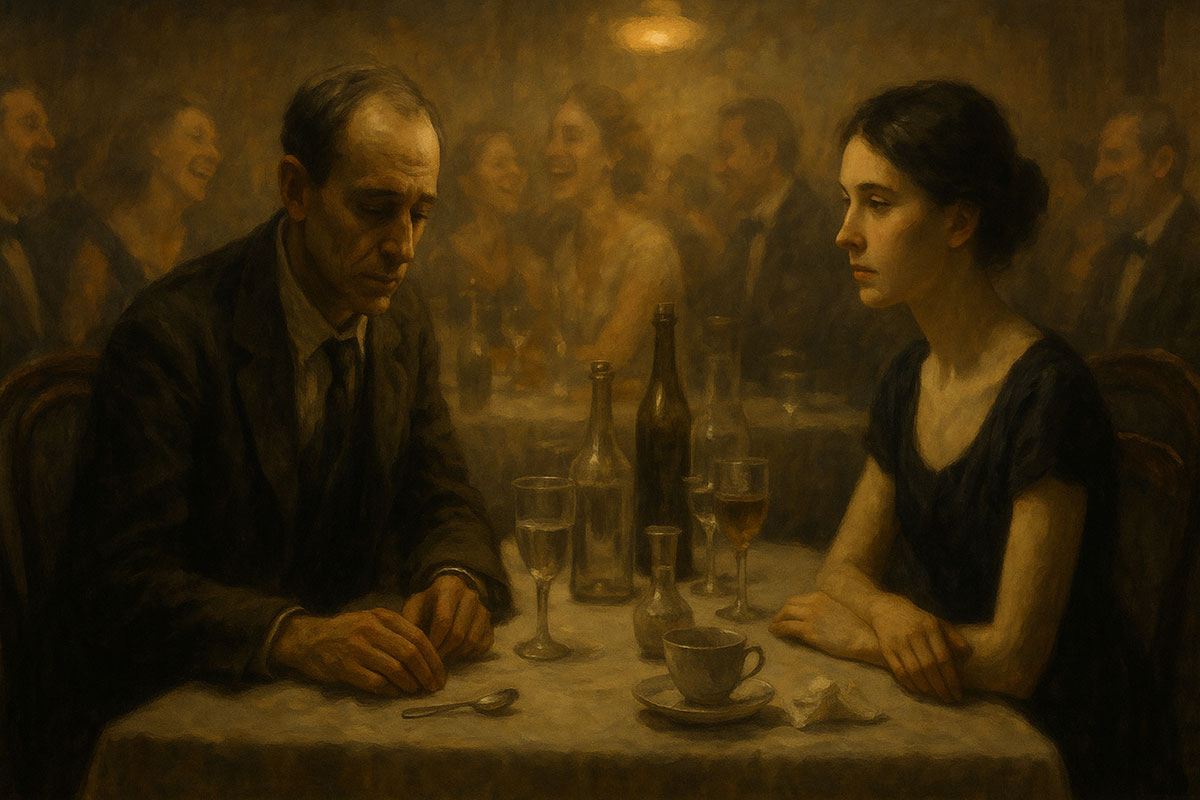
[Stage: A café, long banquet table. Guests laugh and toast one another. PRUFROCK sits at the end, isolated, staring at his teacup. Across from him sits a WOMAN (silent, enigmatic). A moment arises where silence falls and all eyes turn away. This is his chance.]
Prufrock (to himself, building courage):
This is the moment.
Now, now, I could speak—
Tell her what trembles inside my chest.
[He half-rises, words trembling on his lips.]
If one, settling a pillow by her head,
Should say: “That is not what I meant at all.
That is not it, at all.”
[The WOMAN tilts her head as though waiting, but PRUFROCK falters, sinking back into his chair. The moment passes. Conversation resumes around him. Laughter erupts. The chance is gone.]
Prufrock (to audience):
And so I swallow my words,
Bitterer than the coffee in my cup.
I have seen the eternal Footman hold my coat, and snicker.
I was afraid.
[The WOMAN rises and leaves. PRUFROCK reaches after her but freezes, hand suspended in air. He withdraws it slowly.]
Prufrock (voice cracking):
Would it have been worth it, after all?
Would it have been worth the risk
Of misunderstanding,
Of laughter?
Would it have been worth… my life?
[The café dissolves into darkness, leaving PRUFROCK alone at the table, lit only by a single flickering candle.]
Scene 5 — The Drowning Dream
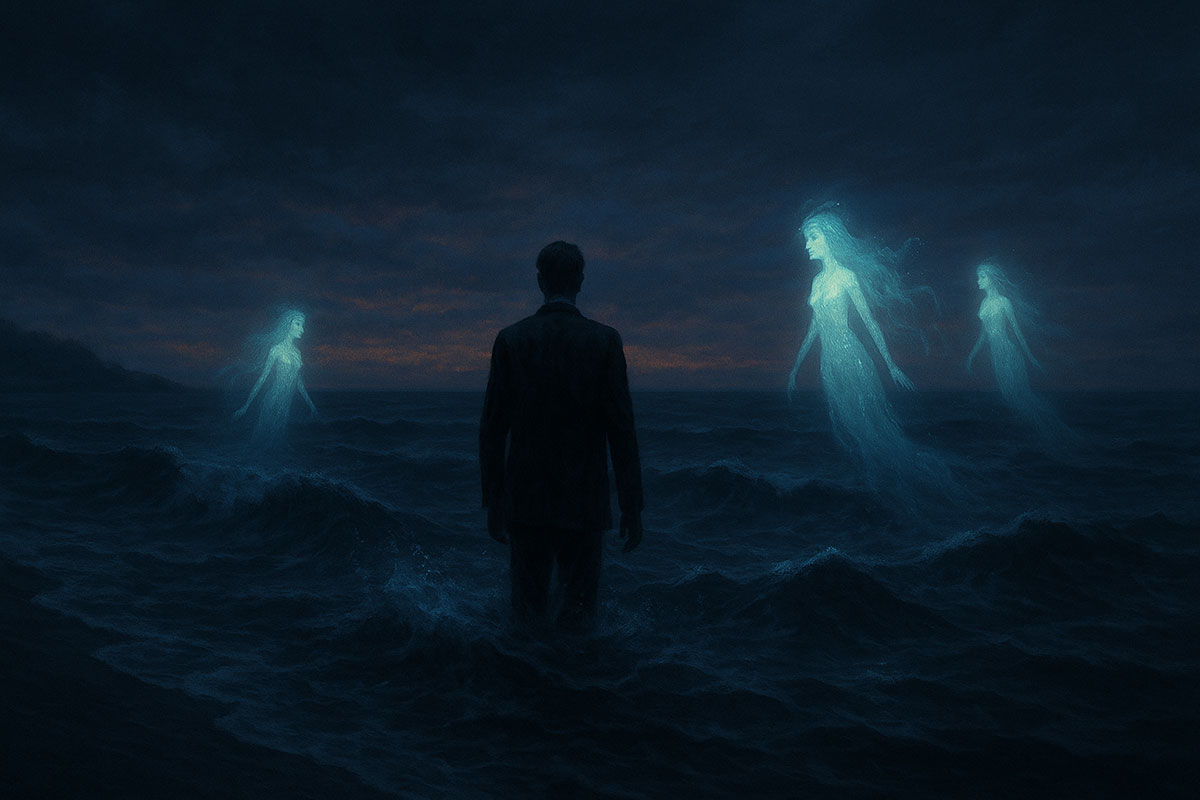
[Stage: A twilight shoreline. Waves crash softly. The backdrop shimmers as though water itself. Ethereal MERMAID VOICES sing faintly. PRUFROCK stands at the edge, his shoes sinking into the sand.]
Prufrock:
I have heard the mermaids singing, each to each.
But I do not think that they will sing to me.
[The mermaid voices swell, beckoning, but always out of reach. He stretches his arms toward them, trembling.]
We linger by seashores we dare not enter.
We dream of songs meant for others.
We imagine ourselves bold…
But awaken always silent.
[The tide rises, swirling around his ankles, knees, waist. He does not resist.]
Prufrock (final monologue):
We have lingered in the chambers of the sea
By sea-girls wreathed with seaweed red and brown,
Till human voices wake us—
And we drown.
[The waves engulf him. Lights dim to black. The last sound: the mermaids’ song fading into silence.]
Epilogue
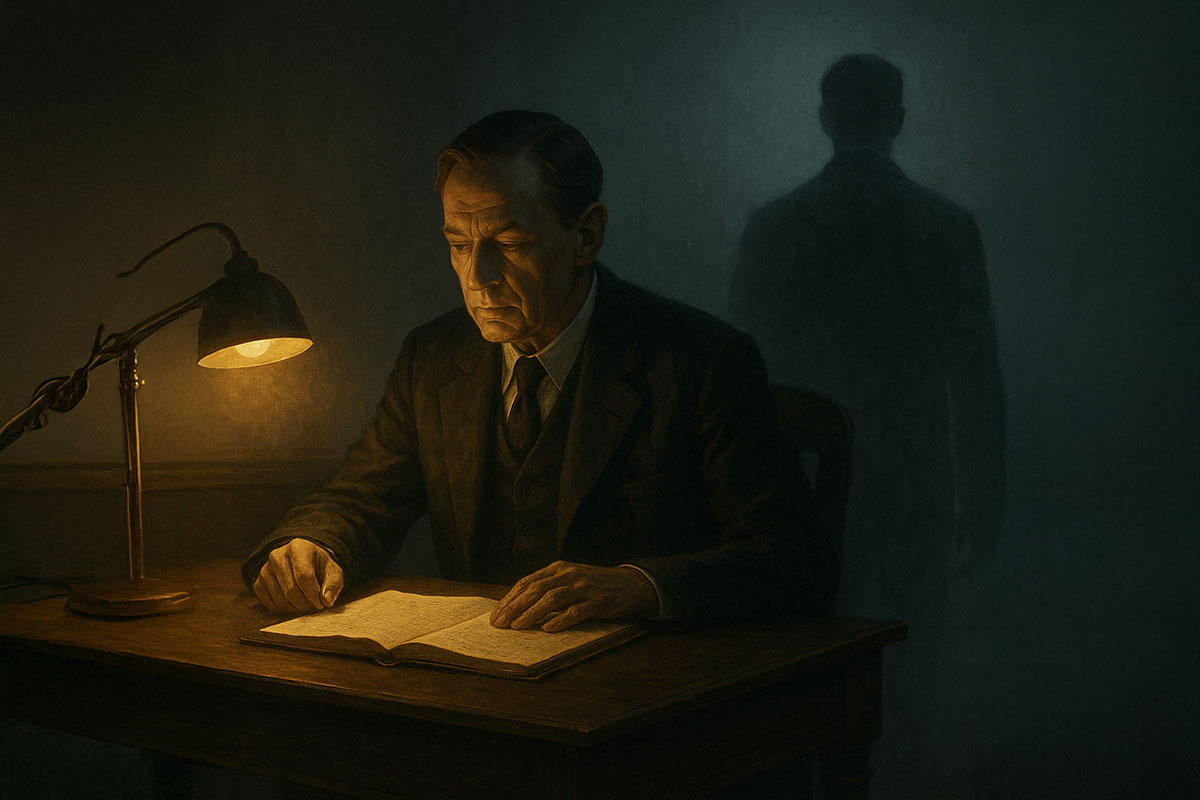
[After Scene 5, the drowning dream fades into darkness. Slowly, light returns to reveal ELIOT once again at his desk. The manuscript lies open. He speaks softly, as though to himself but for all to hear.]
Eliot:
And so, Prufrock remains.
Not drowned by the sea,
But by silence.
Not destroyed by catastrophe,
But by the quiet erosion of unspoken words.
There are no epics here,
No triumphs, no conquests,
Only the ordinary heroism of indecision.
And perhaps that is why he endures—
Because in him we glimpse
Our own private hesitations,
Our own quiet defeats,
Our own longing for mermaids
Who never turn their heads our way.
If he could have spoken,
If he could have dared,
The play might have ended differently.
But it did not.
And perhaps it never will.
[He closes the manuscript, exhales, and stands. The stage darkens.]
Eliot (final words in the dark):
This was his love song.
And perhaps, in fragments,
It is ours as well.
[Blackout.]
Short Bios:
T.S. Eliot (1888–1965)
Modernist poet, critic, and Nobel laureate, Eliot reshaped 20th-century literature with works like The Love Song of J. Alfred Prufrock and The Waste Land. His poetry explores alienation, fragmentation, and the search for meaning in a disjointed world.
J. Alfred Prufrock (Fictional Character)
The anxious narrator of Eliot’s Love Song, Prufrock embodies hesitation, regret, and longing. His voice gives shape to the modern condition of isolation, caught between desire for intimacy and fear of judgment.
The Women in the Drawing Room
Symbolic figures representing society’s polite circles. They embody superficial chatter and social expectation, against which Prufrock measures his inadequacy and silence.
The Mirror Voice
A haunting projection of Prufrock’s own conscience. It crystallizes his fear of judgment and futility, reflecting the harsh self-criticism that keeps him paralyzed.
The Silent Woman
An imagined moment of intimacy in the café. Her silence is a mirror to Prufrock’s own inability to speak — she symbolizes the opportunity for connection that slips away.
The Mermaids
Dreamlike symbols of beauty and transcendence. They embody a world of meaning and song that Prufrock longs for but believes forever beyond his reach.

Leave a Reply